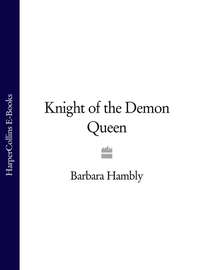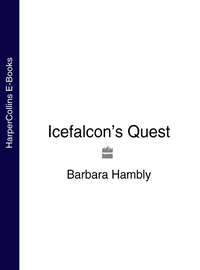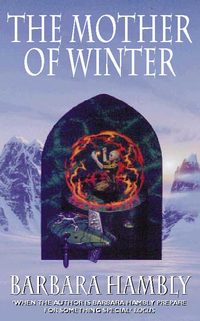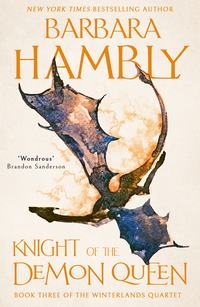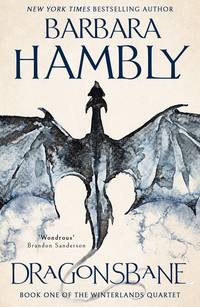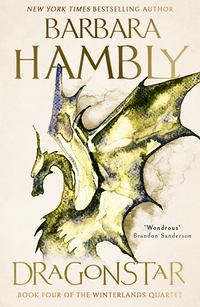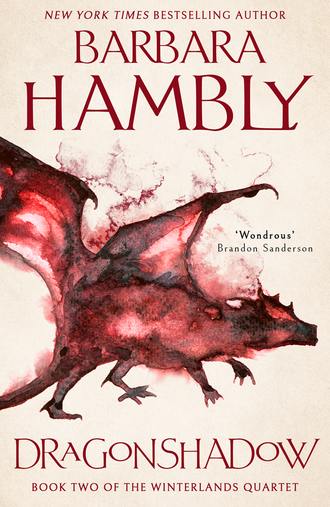
Полная версия
Dragonshadow
John caught her hand as she would have lowered it and kissed her dirty fingers; and she drew down his in return, pressed her lips to the scruffy leather, the battered chain-mail of his glove. Skaff Gradely and the Darrow boys had come up by this time, arguing all the way with Borin’s fellow messengers, with the spare horses and the baggage, so there was little to stay for.
“Borin will ride with you,” Commander Rocklys said, “and his fellows. Send one of them to me when you’ve come up with these bandits and their wizard. Let us know where you are and if you need troops. I’ll dispatch as many as I can, as swiftly as I can. And bring the woman alive, at whatever the cost. We’ll make it worth her while to pledge her services to the Realm.”
“Even so.” Jenny swung to Moon Horse’s saddle again and adjusted her halberd and bow. She wondered what reward she herself would consider “worth her while” to betray John, to turn against him, to ride with his foes …
Or, she thought, as the twenty-five picked pursuers formed up around her, to leave him and our children and the folk of Alyn Hold to their own devices, when I know there’s a bandit wizard abroad in the lands?
The good of all the Winterlands, maybe.
The good of the Realm, which John considered his first and greatest loyalty.
She lifted her hand to him as she and the men rode off. A little later, as they crested the rise above the ravine and approached the oak woods into which the bandits had fled, she looked back to see Commander Rocklys marshaling her forces to ride back to Cair Corflyn, the garrison on the banks of the Black River, which was the headquarters for the whole network of new manors and forts. John’s doing, those garrisons, she thought. The protection he had bought with the blood he’d shed, dragon-fighting four years ago. His reward.
As the dragon-magic in her veins was hers.
John himself stood, a small tatty black figure on the high ground above the stream, watching her. She lifted her hand again to him, and his spectacles flashed like mirrors as he waved good-bye. The wasting moon still stood above the moors to the west, a pale crescent like a slice of cheese.
Less than three weeks later, before that moon waxed again to its full, a real dragon descended on the farms near Alyn Hold.
THREE

“A HUNDRED FEET long it was, my lord.” Deke Brown from the Lone Steadings, a man John had known all his life, folded his hands together before his knees and leaned forward from the library chair in the flicker of the candlelight. His face was bruised, and there was a running burn on his forehead, the kind John knew was made by a droplet of the flaming acid that dragons spit. “Blue it was, but like as if it had gold flowers spread all over it, and golden wings, and the horns of it all black and white stripes, and maned like a lion. It had three of the cows, and I bare got April and the babies out’n the house and in the root cellar in time.”
In the silence John was very conscious of the hoarseness of the man’s breathing, and of the thumping of his own heart.
No illusion this time. Or a damn good one if it was.
Jenny, wherever you are, I need you. I can’t handle this alone.
“I heard down in the village that Ned Wooley was up here yesterday, from Great Toby.” Brown spoke diffidently, trying to word it without sounding accusing. “They said this thing killed his horse and his mule on the road to the Bottom Farms, and near as check killed him.”
John said, “Aye.” He swallowed hard, feeling very cold inside. “We’ve been makin’ up the poisons and gettin’ ready to go all day. You didn’t happen to see which way it went?”
“I didn’t, no, my lord. I was that done up about the cows. They’re all we’ve got. But April says it went off northwest. She says to tell you she saw it circling above Cair Dhû.”
“You give April a kiss for me.” He knew the ruins of the old watchtower, every ditch, bank, and clump of broken masonry; he’d played there as a child, risking life and soul because blood-devils haunted them at certain times of the year. He’d hunted rabbits there, too, and hidden from his father. At least I’ll be fighting it on familiar ground. “Get Cousin Dilly to give you something from the kitchen, you look fagged out. I’ll be going there in the morning.”
He drew a deep breath, trying to put the thought of the dragon from his mind. “We’ll see about getting you another cow. One of the Red Shaggies is heavy with calf; I could probably let you have the both of them. Clivy writes that red cows give more wholesome milk that’s higher in butter, but I’ve never measured—still, it’s the best I can do. We’ll talk about it when I get back.”
If I get back.
Brown disappeared down the tower stair.
Jenny, I need you.
Behind him a clock chimed the hour, amid a great parade of mechanical lions, elephants, trumpeters, and flying swans. The moon turned its phases, and an allegorical representation of Good thumped Evil repeatedly over the head with a golden mallet. John watched the show with his usual grave delight, then got up and consulted the water-clock that gurgled quietly in a corner of the study.
Not even close.
Shaking his head regretfully, he descended the tower stair.
He passed the kitchen, where Dilly, Rowan, and Jane clustered around Deke Brown, exclaiming over his few bruises and filling him in on what had befallen Ned Wooley—“A hundred feet long, it was, and breathed green fire …”
Ian was in the old barracks court, the firelight under the cauldrons gleaming on the sweat that sheathed his bare arms. Tawny light tongued Jenny’s red and black poison pots, carefully stoppered and arranged along a wall out of all possible chance of being tripped over, broken, or gotten into by anything or anyone. The fumes burned John’s eyes. It was all a repeat of the scene three weeks ago.
He hoped to hell the stuff would work.
“Father.” The boy laid his stirring stick down and crossed the broken and weedy pavement toward him. Muffle and Adric put down their loads of wood and followed, stripped, like Ian, to their breeches, boots, and knitted singlets in the heat; clothed like Ian in sweat. “That messenger wasn’t …?”
“Deke Brown. It hit his farm.”
“Devils bugger it,” Muffle said. He hitched his belt under the muscled roll of his huge belly. “April and the children …?”
“Are fine. April saw the thing to ground at Cair Dhû.”
“Good for April.” John’s half-brother regarded him for a moment, his thick, red-stubbled face eerily like their father’s, trying to read his thoughts. “No word from Jenny?”
John shook his head, his own face ungiving: a holdover, he supposed, from growing up with his father’s notions about what a man and the Lord of Alyn Hold must and must not feel. It would never have occurred to him to beat Adric for showing fear—not that Adric had the slightest concept of what the word meant. And Ian …
Mageborn children feared different things.
“Wherever she is, she can’t come.” The bloody light darkened the red ribbon he’d braided yesterday into his hair. I’ll scry every evening in my crystal … “Or she can’t come in time.”
“I could go to the house on Frost Fell.” Ian wiped his face with the back of his arm. “Mother’s books—old Caerdinn has to have written down how to do …” he hesitated, “how to do death-spells.”
“No.” John had thought of that yesterday.
“I don’t think these poisons are going to work against a dragon unless there are fresh death-spells put into their making.” Returning from the false alarm and ambush, John had cleansed the harpoons with water and with fire, as Jenny had instructed him to do: a necessary precaution given little Mag’s eerie facility with locks, bolts, and anything else she was particularly not supposed to get into. Jenny, he knew, was conscientious about the Limitations she put on the death-spells. It had never occurred to either of them that they’d be needed again so soon. “We need to put death-spells on the harpoons as well.”
“No.” John had thought of that, too. “I don’t want you touching such stuff.”
“But we don’t want you to die!” protested Adric reasonably.
Muffle raised his brows and looked away in a fashion that said, The boy’s got a point.
“Mother uses them.”
“You’re twelve years old, Ian.” John swallowed hard, hoping by all the gods that his own fear didn’t show. “Leavin’ out the fact that certain spells can be too strong for an inexperienced mage to wield—”
“I’m not inexperienced.”
“—you haven’t learned near all there is to know about Limitations, and I for one don’t want to end up havin’ one of me feet fall off from leprosy in the middle of the fight because you got a word wrong.”
Surprised into laughter, Ian looked quickly aside, mouth pursed to prevent it. Like many boys he had the disapproving air of one who feels that laughter is not the appropriate response to facing death, especially not for one’s father. John had suspected for some time that both his sons regarded him as frivolous.
“Now, get back to stirring,” he ordered. “Is that stuff settin’ up at all like it’s supposed to? Adric, as long as you’re down here you might as well stir that other cauldron, but for God’s sake put gloves on … We’ve got a long night.” He stripped off his old red doublet and his shirt and hung both on pegs on the work shed wall. The smell of summer hay from the fields beyond the Hold filled the night. Though midnight lay only a few hours off, the sky still glowed with light. As he pulled on his gloves, John watched them all in the firelit court: his sons, his brother—his aunts, Jane and Rowe and Hol, and Cousin Dilly, coming down with gingerwater and trying to tell Adric it was time for him to go to bed. Seeing them as Jenny would be seeing them, wherever the hell she was, gazing into her crystal. Rowe with her long untidy braids of graying red and Dilly peering shortsightedly at Muffle, and all of them chatting like a nest of magpies—the real rulers, if the truth be told, of Alyn Hold.
She has to know what all this means. He closed his eyes, desperately willing that Jenny be on her way. I’m sorry. I waited as long as I could.
Teltrevir, heliotrope … His mind echoed the fragments of the old dragon-list. Centhwevir is blue knotted with gold. Nymr blue violet-crowned, Glammring Gold-Horns bright as emeralds … Scraps of information and old learning:
Maggots from meat, weevils from rye,
Dragons from stars in an empty sky.
And, Save a dragon, slave a dragon.
Secondhand accounts, most of them a mash of broken half-volumes; notes of legends and granny rhymes; jumbled ballads that Gareth collected and sent copies of. Everything left of learning in the Winterlands, after the King’s armies had abandoned them to bandits, Iceriders, cold, and plague. He’d gathered them painfully from ruins, collated them in those few moments between fighting for his own life and the lives of those who depended on him … Secondhand accounts and the speculations of scholars who’d never come closer to a dragon than the sites of old slayings, or a nervously cursory inspection of torn-up, blood-soaked, acid-burned ground.
Something in there might save his life, but he didn’t know what.
Antara Warlady was supposed to have gotten right up next to the Worm of Wevir by wrapping herself in a fresh-flayed pig hide, according to the oldest Drymarch version of her tale; Grimonious Grimblade had supposedly put out live lambs as bait.
Alkmar the Godborn had been killed by the third dragon he fought.
Selkythar of golden curls and sword of sunlight flashing,
Seeking meed of glory through the dragon’s talons lashing.
Cried he, “Strike again, foul worm, my bloody blade is slashing …”
John shook his head. He’d never sought a meed of glory in his life, and if he ever decided to start, it wouldn’t be by riding smack up a long hill in open daylight as Selkythar had reportedly done, armed with only a sword—well, a shield, too, as if a shield ever did any good against a thirty-foot hellstorm of spitting acid and whirling spikes.
“The boy may be right.” Muffle’s voice pulled him out of his memories of the Dragon of Wyr, of Morkeleb’s black talons sweeping down at him from darkness …
John dipped the harpoon he held into the cauldron and watched the liquid drip off the iron, thin as water.
“Stuff ain’t thickenin’ up,” he sighed. “Maybe I should get Auntie Jane back here. Her gravies always set.”
Muffle caught his arm. “Be serious, son.”
“Why?” John rested the harpoon’s spines on the vat’s edge and coughed in the smoke. “I may be dead twenty-four hours from now.”
“So you may,” replied the blacksmith softly, and glanced across at Ian in the amber glare. “And what then? Four years ago you bargained with the King to send garrisons. Well, they’ve been gie helpful, but you know there’s a price. If you die, d’you think your boys are going to be let to inherit? In the south they’ve laws against wizards holding property or power, and Adric’s but eight. You think the King’s council’s going to let a witch be Regent of Wyr? Especially if they think they can get tax money by ruling here themselves?”
“I’m the King’s subject.” John stepped back from the fire, hell-mouth hot on his bare arms. “And the King’s servant, and the Regent’s me friend. What’re you askin’? That I not fight this drake?”
“I’m asking that you let Ian do what he’s asked to do.”
“No.”
Muffle pursed his lips, which made him look astoundingly like their father. Except, thought John, that their father had never let things stop with pursed lips, nor would he have reacted to No with that simple grimace. The last time John had said a flat-out No to old Lord Aver, at the age of twelve, he’d been lucky his collarbone had set straight.
“In the village they say the boy’s good. He goes over those magic-books in your library like you go over the ones on steam and smokes and old machines. He knows enough …”
“No,” said John. And then, seeing the doubt, the fear for him in the fat man’s small brown eyes, he said, “There’s things a boy his years shouldn’t know about. Not so soon.”
“Things you’d put your life at risk—your people at risk—to spare him?”
John thought about them, those things Jenny had told him lay in old Caerdinn’s crumbling books. Things he’d read in the books that had been part of his bargain with Prince Gareth to fight the Dragon of Nast Wall. Things he read in Jenny’s silence when he surprised her sometimes in her own small study, studying in the deep of night.
He said, “Aye.” And saw the shift in Muffle’s eyes.
“People hereabouts know the magic Jen does for them.” John picked up the harpoon and turned the shaft in his hands. “Or what old Caerdinn did. Birthin’ babies, and keepin’ the mice out of the barns in a bad year, or maybe buyin’ an hour on the harvest when a storm’s coming in. Those that remember me mother are mostly dead.” He glanced up at Muffle over the rims of his spectacles. “And anyway, by what I hear from our aunties, me mother never did the worst she could have done.”
Except maybe only once or twice, he thought, and pushed those barely coherent recollections from his mind.
“People here don’t know what magic really is,” John went on. “They haven’t seen what it can do, and they haven’t seen what it can do to those that do it. You always pay for it somehow, and sometimes other people besides you do the payin’. Gaw,” he added, turning back to the cauldron and dipping the harpoon once more, “this’s blashier than Cousin Rowanberry’s tea. Let’s put some flour in it, see if we can get it thick enough to do us some good.”
Ian’s heart beat hard as he kicked his scrubby pony to a gallop up Toadback Hill.
Death-spells.
And the dragon.
He’d always hated the harpoons with which his father had killed the Dragon of Wyr, two years before he was born. He had instinctively avoided the cupboard in his father’s cluttered study in which they were locked. If he touched the wood he could feel them, even before he realized that he had magic in him. Sometimes he dreamed about them, each barbed and pronged shaft of iron its own ugly entity, whispering in the darkness about pain and cold and giving up.
His mother had wrought well.
Ian shivered.
For the first eight years of Ian’s life he had only seen her now and then, for she’d lived alone with her cats on the Fell, coming to be with his father at the Hold for a few days together. She had told him later—when his own powers had crossed through that wall from dreaming to daytime reality—that in those days her powers were small. She had kept herself apart to study and meditate, to work on what little she had. There was only so much time in her life to give.
And then had come the Dragon of Nast Wall.
His parents had gone away to the south together to fight it, along with the messenger who’d fetched them, a gawky nearsighted boy in spectacles. That boy had turned out to be Prince Gareth, later Regent for the ailing King Uriens of Belmarie. At that time Ian had accepted without question that his father could easily slay a dragon and hadn’t been particularly concerned. As if to confirm him in this opinion, his parents had returned more or less unharmed, and he didn’t learn until much later how close both had come to not returning at all.
After that, Jenny had lived at the Hold. But she still went sometimes to meditate in the stone house on Frost Fell, and it was there that she’d begun to teach Ian, away from the Hold’s distractions. In that quiet house he did not need to be a brother or a nephew or a father’s firstborn son.
Even had Ian not been mageborn and able to see easily in the clear blue darkness, he could have followed the path that led away from the village fields over Toadback Hill. Ruins dotted the far slope, one of the many vanished towns that spoke of what the Winterlands had been and had become. Shattered walls, slumped puddles where wells had been, all were nearly drowned now in the mists that rose from the cranberry bog.
From the hill crest he looked back and saw his father and his uncle by the village gates, talking with Peg the Gatekeeper. The gates were squat and solid, built up of rubble filched from the broken town. Lanterns burned over them, but Ian did not need those dim yellow smudges to see how his father turned in Battlehammer’s saddle, searching the formless swell of the hills, gesturing as he spoke.
He knows I’m gone. Ian felt a stab of guilt. He’d laid a word on Peg, causing her to rise from her bed in the turret and lower the drawbridge to let him pass. This cantrip wasn’t something his mother had taught him, but he’d learned it from one of Caerdinn’s books and had experimented, mostly on the unsuspecting Adric. He knew perfectly well that such magic was an act of betrayal, of violation, and he squirmed with shame every time he did it, but as a wizard, he felt driven to learn.
He was glad he’d practiced it, now.
It was still too dark to distinguish his pony’s hoofprints in the mud. In any case, he guessed his father had no time to search. Nor had he, Ian, any to linger. He shrugged his old jacket closer around him and put his pony to a fast trot through the battered walls, and the rags of bog mist swallowed them.
Death-spells. His palms grew clammy at the thought. In a corner of his mind he knew perfectly well that he might not have the strength to wield them, certainly not to wield the dreadful power he sensed whenever he touched the harpoons. But he could think of no other way to help. Since the coming of that first word of the dragon yesterday, he’d tried desperately to make contact with his mother in the ways she’d told him wizards could, by looking into fire or water or chips of ensorcelled crystal or glass. But he had seen only confusing images of trees, and once a moss-covered standing stone, and water glimmering in the moon’s waxing light.
Remember the Limitations, he told himself, ticking over his mother’s instructions in his mind. And gather up the power circles afterward and disperse them. Don’t work in a house. Don’t work near water …
There had to be something in the house at Frost Fell that he could use to save his father’s life.
Frost Fell was a hard gray skull of granite, rising nearly two hundred feet above waterlogged bottomlands—enough to be free of the mosquitoes that made the summers of Winterlands such a horror. In spring, huge poppies grew there, and in fall, yellow daisies. Most of the other fells were barren of anything but heather and gorse, but Frost Fell boasted a modest pocket of soil at its top, where centuries ago some hardy crofter had cultivated oats. These days it was his mother’s garden, circled like the house in wardings and wyrd-lines. Ian reviewed these in his mind, hoping he’d be able to get past the gate, hoping he could open the doors. Triangle, triangle, rune of the Eye … The last two times he’d been there she’d simply stood back and let him do it, so there was a chance …
Light burned in the house.
She’s back! Exultation, and blinding relief. A dim glow of candle flame, like a stain on the blue bulk of shadow. The rosy flicker of hearth-fire glimpsed through half-open doors. He wrapped the pony’s rein hastily around the gate, ran up the path. She’s back, she’ll be able to help!
It wasn’t until his foot was on the step that he thought, If it was Mother, she’d have ridden at once to the Hold.
And at that moment, he saw something bright on the step.
He stopped and knelt to look at it. Like a seashell wrought of glass, thin as a bubble, broken at one end. A little beyond the broken end lay what appeared to be a blob of quicksilver, glistening on the wet stone in the reflected candle-glow.
“Go ahead.” A deep, friendly voice spoke from within the house. “It’s all right to touch it. It’s perfectly safe.”
Looking up Ian saw a man sitting by his mother’s hearth, a man he’d never seen before. Big and square and pleasant-faced, he was clothed like the southerners who came from the King’s court, in a short close coat of quilted violet silk lined with fur, and a fur-lined silk cap embroidered with violets. Expensive boots sheathed his calves and a pair of black kid gloves lay across his knee, and in his pale fingers he turned a jewel over and over, a sapphire dark as the sea. Ian knew he had to be a wizard, because he was in the house, but he asked, “Are you a mage, sir?”
“I am that.” The man smiled again and gestured with his finger to the frail glass shell, the bead of quicksilver on the step. “And I’m here to help you, Ian. Bring that to me, if you would, my boy.”
Ian reached toward it and hesitated, for he thought the quicksilver moved a little on the stone of the step. For an instant he had the impression that there were eyes within it, looking up at him. Bright small eyes, like a lizard or a crab. That it had its own name, and moreover that it knew his. But a moment later he thought, It has to be just the light. He carefully scooped the thing up in his hand.
FOUR

ALKMAR THE GODBORN, greatest of the heroes of antiquity (it was said), slew two dragons while serving the King of Ernine—though according to Prince Gareth there was a late Imperteng version of the legend that said four—using a lasso made of chain and an iron spear heated red-hot, which he threw down each dragon’s throat. Must have been on a cable, thought John, though of course Alkmar had been seven and a half feet tall, thewed like an ox, and presumably had a lot of time to spend at throwing practice.


